- Home
- Claire North
The Pursuit of William Abbey Page 6
The Pursuit of William Abbey Read online
Page 6
In the town of Baker… there was a night when a child was burnt… his mother… there was a thing… a shadow… I… have you… does she… did you…?
I ran out of words. Saying truth is even harder than knowing it.
For a long time she was quiet, thinking about all that I had muttered. Then:
“You want to forgive. To be… forgive. But you kill my brother. You start fire. All you. All you kill him. You make this world. Men. British. You make this. And you say it is good, because you, for you, it is good. You do well. And when I say it is bad, you say no, because you feel good. You make this world, where it is good to kill Langa. You kill him. You in making. You kill him. Then you think, maybe this thing was bad. So you come here. Ask me to tell you that you are good. To forgive. My English is not – I speak three, but English is not. I speak language was spoken here thousands years. Before you made this world. Now you come here, say, make me good again.
“Langa follows me. He follows. You know nothing of him. You do not know who he loved. You do not know why he laughed. You do not know his story. His way of walking. His way of being. You just know black woman put shadow on you, black boy follow you, black woman forgive you. We – in your story. You do not know our story. You do not hear our story of when white men came and killed my brother. You do not see. Want everything to serve you. I will not. I will not serve you. You will never know Langa. It is not him that follows you. It is shadow. Only shadow. Langa died and I do not forgive. Do not need to tell you why. Do not need you. Go away, white man. Come back when you speak my language.”
She would say nothing more to me. I could not persuade her. Truth was, I had no right to try.
At 11.23 p.m. on 8 July 1884, the shadow of Langa was observed crawling out of the body of my sister in her home in Houndsditch, turning south and beginning its slow walk.
One hundred and fifty days later, I began to dream the dreams of my neighbours.
Three days after that, I began to know the truth of my neighbours’ hearts.
Six days after that, the truth that was maddening me was a compulsion upon my lips, a desperate babble of unwished-for realities that no one wanted to hear and that drove me, like a man caught in a dream, to stagger around the town from man to woman howling the deepest secrets of their hearts.
He moves without resting, at a set speed, always towards me. These things may be plotted, understood, mapped and named.
I did not know that then, and so the shadow came again to Baker.
Here are some of the truths of the people of Baker, screamed out into the bloody setting sun.
Baker Senior was never first mate upon his vessel as he claimed, but robbed a man in port and fled for Blood River with scarlet on his skin and a gun upon his back. He has made his children into monsters who no one will ever love, but it was the only way he could think to do right by them, in this land of dust.
Thozoma does not understand why the men of her tribe do not rise up as Cetshwayo kaMpande did, standing for honour, justice and the rights of his people against a foreign plague, and thinks they all are cowards, and wishes she had been born a man.
Khwezi loves his wife even more than he loves the horses, and every time he tries to say so he gets it wrong, so he declares his affection to the beasts rather than the human, since they are so much easier to talk to.
Ndiliwisa has epilepsy, and knows that’s her disease because her mother had it too, and once met a Xhosa man with the same condition who had assisted a surgeon in Cape Colony who was frequently too drunk to work, and who didn’t know that his servant loved to read. And Ndiliwisa knows that in time, it will take her mind as it is taking her mother’s, and that if she is not a sangoma then she is a cursed half-child, but this way she is blessed, and her mother knows secrets that are as true as the darkness itself.
Mr Smid knows that his wife looks at black men with lust in her eyes, and understands that he is small, and weak, and ugly, and hates the world without understanding how that hatred grew. Sometimes – very, very occasionally – he catches himself in acts of meaningless cruelty, and repents his habit, then forgets.
Kent fell to malaria trying to bring Jesus to the people of the Congo basin. They were perfectly polite, listened patiently, spoke French, Italian and a dozen other native tongues, and sent him on his way with a present of ripe nuts and a flagon of Plymouth rum, which they had traded with the merchants who came up the river. He had gone into the jungle looking for the savage, but the merchants had got there first, and so he found men and women dressed half in animal skins and strings of woven leaves, and half in cheap Chinese silks and French lace, American hats and English frock coats. “Thank you, thank you,” they murmured. “Thank you for your Jesus. We will definitely keep it in mind.”
He had not seen any signs of cannibalism, except once when a woman ate a monkey’s arm, and he had come away bitterly disappointed and with a permanent itch in his right eye, which was steadily going blind.
These are the truths I screamed to anyone who dared to look at me on that hot sunset night in the town of Baker. In the end, Kent suggested they take me to Kimberley, that I was clearly sick and needed help. Baker Senior replied that I was a rabid dog and needed a bullet more than a needle, and blustered away before I could blather any more secrets to his face.
And as people wondered what to do about me – without daring to get too close for fear of the truths I might utter – there was the shadow. He shuffled down the middle of Main Street, swaying a little against the setting crimson sun. As he approached, his broken arm lifted towards me, a greeting of open fingers and upraised palm. His face was as I had seen it before, a thing of contours without colour, a form through which I could still half make out the houses and people. His lips were still melted, his hair burnt to a sizzling scalp. Langa came, as he had come before, and I wept and begged anyone, anyone at all, to say they could see him, and they could not, so in the end I climbed to my feet, and turned, and ran away.
Chapter 13
I run, and the shadow follows.
This is the way of things.
I fled Baker with just the clothes I wore and the money in my pocket. I ran without direction for a little while, into the dusty places of orange soil and faded leaves, broken here and there by patches of tiny yellow and purple flowers that cling on to water that only they can find. The boab offered no shade, and the earth peeled like onion beneath my feet. In the distance, white bones of stone pushed upwards like tumours from the flesh of the earth, and once I nearly stepped on a snake, which didn’t even hiss its contempt as it slithered away into the spiky brown grass.
After an hour or two, I couldn’t see Langa behind me, and stopped, hands on my knees, gasping for breath, wondering what madness had overtaken me. Here, away from men, the pounding of their truths in my heart was faded to nothing, and there was only the thin, cold wind and an afterthought of setting sun, silky greys and forest blues across the star-speckled sky. I realised that I was almost certainly lost, and thought of lions and scorpions, and was immediately a whole new flavour of afraid. I tried to retrace my steps, to turn back towards Baker, but in the starlight all I could see were different layers of darkness against the soil, a curve of black that rolled down towards a flat, infinite horizon. I laughed, and shouted, “Help!” and the world around me was far too big for the sound to make any difference at all.
In the end, I picked a direction, and walked as loudly as I could to frighten any animals that might be lurking, thumping against the earth, kicking at scrub and thorny grass, until I came to an outcrop of stone above a thin, sluggish river. Scrambling to the top, I sat down to catch my breath, and told myself that it would be all right not to sleep, but simply to watch the stars and think about what had happened to me and how to remedy it, since I was clearly ill. A lunatic asylum wouldn’t do, of course – I had seen the chains that held the insane, and had no desire to be dunked in icy baths or beaten with birch to effect my cure.
And yet, how san
e I felt, now that I was away from people! Clearly my malady was so potent it had deceived me into believing that I was cured when obviously I was not; how terrible it was to be unable to trust in my own thoughts. Self-pity would wait; my condition needed diagnosis. I had witnessed a trauma, experienced some guilt, and been affected by the sun. Fresh air and hearty walks! If all else failed, that prescription would still be my salvation.
Such was my thinking, and a wild loop of conclusion and rejection, enquiry and dismissal it was, so that I could not imagine I would sleep, until, of course, I did.
I woke to the dawn light, and thought for an instant that it was still the sunset glow by which I’d fled, and I had spun, spun and spun again. A beetle was sitting upon my cheek; my neck, hands and ankles were flecked with a hundred bites from tiny flies, but other than that I seemed fairly untouched by nature, save that my whole body hurt from my uncomfortable bed. Crawling upright in a creaking of bones and groans, I looked back along the broken path I’d carved across the dusty land, and there he was, no more than a hundred yards behind, coming towards me. Langa, a bare half-shadow against the cold morning light, a thing that might be illusion, if there was any choice other than to think he was real.
He came; I ran.
I have witnessed sunrise in the frozen steppes of Asia: symphonies of azures and silvers, punched through with snowy whiteness as if the sun was sending sharpened heralds to announce its progress. I have watched dawn on the China Sea, the water a mirror of slippery gold that burns the sky to puffy white. I have stood on the shores of Japan and heard the temple bell; watched the shadows chased out of the canyons of North America like dogs before the wolf. But that morning in the grasslands, I ran with the shadow at my back, and the sky was the purple of an emperor’s robes, shredded with blood, and the land seemed to swallow the crimson whole and bleed with the day.
Sometimes I outran him, and he vanished from my sight.
Then I would climb an outcropping of chalky grey rock, and look back, and there he was, shimmering in the morning heat, following, and I ran.
Sometimes I would stop to catch my breath, or pause by a pool of stagnant blue-green water to gulp and gasp, and when I looked up it was as if an hour had passed, and maybe it had, and there he was, and I howled like an injured cat and scrambled on.
Soon I could only walk, feet swollen in my shoes, jacket discarded, buttons undone to the midday heat. By evening, our pace was more or less the same. He shuffled his burnt-out gait, never lifting his feet, and I limped on, like two ships in the same wind; never closing, never retreating, caught just on the edge of sight.
The pain in my feet and legs, the dizzy nausea of too long walking unprotected in the sun, kept me from thinking about hunger. As the sun dipped back towards the horizon, one sensation at a time surfaced and fell within the cauldron of my soul. At this instant: my mouth was leather and surely I would die. And then at the next: my legs were stone and surely I would fall. And now: my feet were fire and surely I would never walk again. In this way, my maladies almost helped me on, for I had so little time to invest in the extremity of one before the extremity of the next distracted me. And so on we went, as the stars blossomed overhead. We walked together through the desert, as the dreamers did in Australia before the fences came, and I thought for a while I knew the names of every star and the secrets of every scuttling living thing that fled before me, and saw behind me the spreading wake of life that I had disturbed, and before me the narrow path I must still walk. And then I looked again, and saw only Langa in the pale moonlight, and he did not stop, and he did not rest, and so on we went.
I fell, and didn’t get up again.
I laughed, and Langa came.
I thought that if he touched me, maybe I would die, and that wasn’t so bad.
Just like Carmine had died.
Closer, closer, a little closer now.
The laughter died on pastry lips.
I got back to my feet, and scrambled a little faster, a little further, then stopped to breathe for a few seconds, then scampered, then stopped, then scampered again, like the wounded springbok runs before the lioness.
A little before dawn I heard the hyena laughing in the scrub. That gave me enough fear to run, for a while.
The boys were tending cattle when they found me. The youngest was nine, the oldest twelve. Two stayed behind, and one helped me up, too small to carry me, but giving me enough of a push by his presence that I made it to the kraal. Langa drifted behind, not half a mile away, oblivious to the rising sun.
In the woven dome, adults, watching, communicating in actions and forced, hard smiles. They gave me water, dry meat, madumbe. One went to remove my shoes, but I shook my head. If my shoes came off, I didn’t know if they’d ever go back on again.
None of the children and only one of the women had ever seen a white man before. The father and his oldest son had, and didn’t think us so fierce. There were nearer, more important fish to fry, for listen, listen, this was the truth of the hearts of those who tended the kraal. I babbled it constantly in a broken whisper as they pushed water between my lips, but thankfully they spoke no English and I had no words of isiZulu.
A mother looks on me in dread and wonders what others will come, if this is the beginning of the end. She fears fire and does not know who she would be if the family fled.
Another, a junior wife, married when she was twelve to this man of forty, has fixed her gaze upon the earth lest anyone see that she has caught the eye of her husband’s son by another wife, a boy of her age. Run away, say his eyes, run away with me and together we shall find our own place…
A boy seethes with resentment that the impis of Cetshwayo no longer muster at Ulundi, and that the promises made to him in the crib of spear and shield were lies; he paints his face and arms with ochre in secret, and prays to the ancestors for a chance to prove his worth, and hopes one day his father will look on him and say something kind, and call him a man.
A brother wonders if I have any money.
His first wife still carries the soul of the child that died in her, and knows she must accept that her failure to bring life is why he has so many other women who do their duty by him, and is grateful to be allowed to remain, and wishes someone else would howl grief with her in the secret hours of the night.
A child laughs, because something strange and new and exciting and wonderful is sitting before it, a creature with burnt red skin and alien, loose hair, and in its heart is joy, and at its lips is a language not yet formed, and full of hope.
They give me food, because you need not like a stranger to know that hospitality is everything.
They give me a skin of water, and gesture no, no, keep it, because hospitality is sacred, but it is also wise to fear someone who comes from nowhere, is going nowhere in the midday sun.
They point in a direction where other white men are.
They smile.
They are eager that I am gone, but would not raise a word against me if I asked to stay, as long as I did not violate the unspoken rules of the guest.
The oldest man heard the hyenas laugh in the night. They will not hunt me during the day, his smile says, but when the sun goes down, be careful that they do not catch you limping.
I look back over my shoulder, and Langa is there, a few hundred yards out.
I try to thank them profusely between my tumbling words, and their hearts understand even if their ears do not, and I stagger on.
Chapter 14
In the dry place, where the hyenas laugh…
I met, or thought I met, a man digging by a muddy pool.
What are you doing? I asked, although perhaps I didn’t, because my voice was gone and my skin was as broken as the earth.
“Nothing,” he replied.
Looking for gold, his heart said. Looking for gold in a place where there is no gold to be found.
“There is no gold,” I rasped, echoing his soul, questioning, confused by the truth of it. “There is no gold
.”
“No. Absolutely. Why would you think that? I’m not digging for gold. I’m just digging.”
He came from Lyme Regis, spent everything he had to get to the Cape. The first time he begged, he swore it would be the last, and when he stole the money to get himself to Kimberley, he knew he’d pay it back. All he needed to do was strike lucky.
He has lost everything now. His pride, his home, his money and his dreams.
The last thing that goes will be hope, and then he will lie down in this place to die. Until then, he keeps on digging, though there is no gold.
Langa followed, so I fled, and left him there, if he was ever there at all.
Someone had raised a crucifix in this place.
There was no road, no shrine, no mound of rocks.
There were no houses, people or cattle.
No pools of water, no running streams.
Only a cross, set upright in the scarlet earth.
I looked for a little while, and kept on walking.
A place where the land turned green. A few shoots of brilliance poking through beneath my feet, thickening, thickening into a carpet of grass. Springbok pecked at grey shrubs, glanced up as I approached, sauntered away, disturbed perhaps less by me than by the predators at my back.
I paused beneath the camel thorn tree, and decided that this was it.
This was where it ended.
If I died, then perhaps the shadow would leave my sisters alone.
Perhaps that was its purpose: to drive a man to this. It seemed just, all things considered.
The first Boer on his yellow-powdered horse spoke Afrikaans when he saw me, and I didn’t understand.
So the second, a boy with the beginning of a man’s beard, said in English, “Are you lost, traveller?”
A hundred yards behind, Langa reached for me as a mother for its child. I laughed, opened my mouth to tell them the hidden truths of their hearts, and someone caught me when I fell.

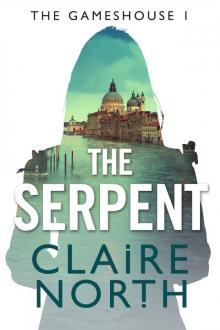 Gamehouse 01 - The Serpent
Gamehouse 01 - The Serpent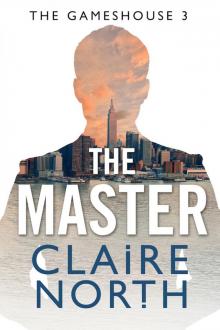 The Master
The Master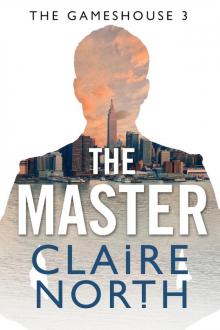 Gamehouse 03 - The Master
Gamehouse 03 - The Master The Thief
The Thief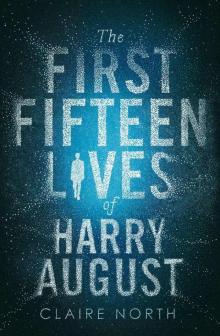 The First Fifteen Lives of Harry August
The First Fifteen Lives of Harry August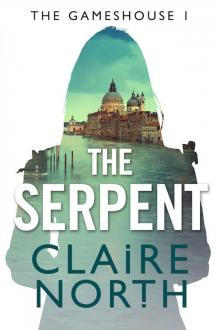 The Serpent
The Serpent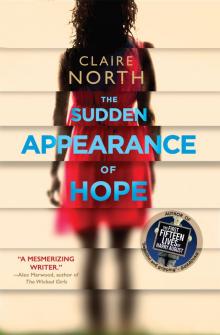 The Sudden Appearance of Hope
The Sudden Appearance of Hope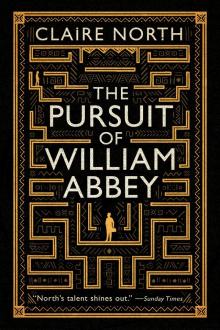 The Pursuit of William Abbey
The Pursuit of William Abbey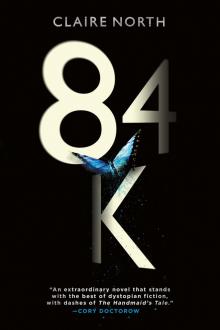 84k
84k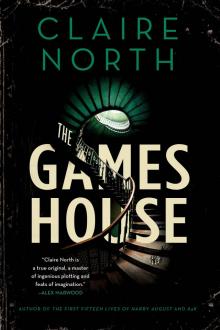 The Gameshouse
The Gameshouse Touch
Touch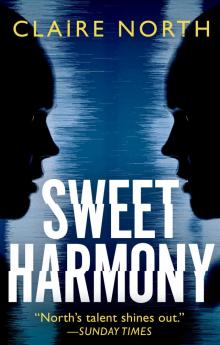 Sweet Harmony
Sweet Harmony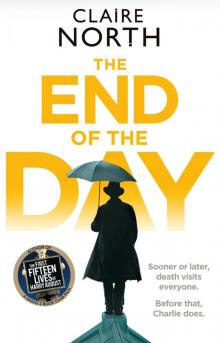 The End of the Day
The End of the Day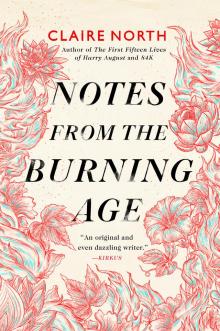 Notes from the Burning Age
Notes from the Burning Age